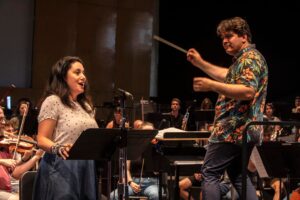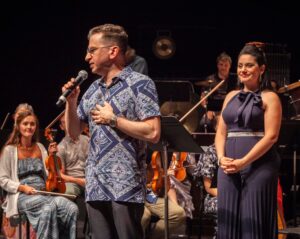Al Hakawati Premiered at 2024 Cabrillo Festival of Contemporary Music
- On August 30, 2024
- By alzand@rice.edu
- In EVENTS, News
 0
0
Al Hakawati, a new work for soprano and orchestra received its premiere on August 2nd in Santa Cruz, CA at the 2024 Cabrillo Festival of Contemporary Music, with soprano Miriam Khalil and conductor Cristian Mӑcelaru. The work will be repeated on September 21 by the WDR Sinfonieorchester Köln in Germany. The work is a co-commission of Cabrillo, WDR and l’Orchestre National de France (who will do the work in 2026).
Al Hakawati (The Storyteller) presents fragments from an opera-in-progress entitled The Book of Tales. The opera is inspired by a recent discovery about a beloved story collection, the so-called “Arabian Nights.” The exact provenance of these medieval Arabic tales, properly known as Alf Laylah wa-Laylah [One Thousand and One Nights], has always been something of a mystery. That all changed in 1993 when a forgotten 18th century Arabic manuscript was found in the Vatican library. It was a travel memoir written by a 75-year-old Syrian storyteller named Hanna Diyab. In 1707, the young Diyab had embarked on an extraordinary, years-long journey to Europe. His incredible adventures culminated in a meeting with the Sun King, King Louis XIV, in the halls of Versailles. Diyab told his entrancing stories to everyone he met in his travels, including to Antoine Galland, a translator and archaeologist in Paris. It was Galland who, in 1710, first introduced Western readers to the stories of Ali Baba and Aladdin in Les Mille et une Nuits—though Galland makes no mention of the storyteller. Diyab returned to Syria in 1709 and eventually became a successful cloth merchant in Aleppo.He seems to have had no idea how far his captivating stories had travelled.
The opera connects stories and storytellers across time and place: from the present day, to the Ancien Régime of France, to the imaginary world of Scheherazade. And, though the “frame story” is Diyab’s, the most significant characters in the story are women. The fragments in Al Hakawati comprise four “scenes” that feature the opera’s three principal female characters.


